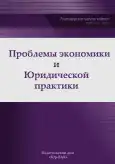Risks of Artificial Intelligence Development in Selected Branches of Russian Economy
- Authors: Alekseev V.N.1, Zuev P.A.1,2
-
Affiliations:
- Moscow Metropolitan Governance University named after Y. M. Luzhkov
- B1 Group of Companies
- Issue: Vol 19, No 3 (2023)
- Pages: 185-191
- Section: Regional and Sectoral Economics
- URL: https://journal-vniispk.ru/2541-8025/article/view/145618
- EDN: https://elibrary.ru/OXBLGD
- ID: 145618
Cite item
Abstract
The article is devoted to the study of the reasons for the formation of artificial intelligence risks in certain sectors of the Russian economy. The relevance of the research is due to the increasing influence of artificial intelligence (AI) on the socio-economic development of the leading countries of the world, the scientific and information blockade of Russia and the growing lag behind world leaders in this field. The article continues the cycle of research on the influence of the AI factor on the socio-economic development of Russia in this publication. In particular: Alekseev V.N. «The evolution of the concept of investment climate in the transitional economy of Russia» 2022 No. 1; Alekseev V.N., Mekaeva A.V. «The impact of artificial intelligence on the investment climate and socio-economic development of Russia» 2022 No. 2 and others. The purpose of this article is to identify the risks of AI in certain industries and offer options for managing them. The object of the study is individual branches of the Russian economy. The subject is the risks of artificial intelligence. Tasks: to identify AI risks; to identify the reasons for the formation of these risks; to propose risk management options. The study allowed us to conclude that in addition to the risks caused by the SVO, the main reasons for their formation are the chronic underfunding of research and development in this area, the lack of programs (projects) for the development of AI for medium and long-term periods. Practical significance. The fact is that the conclusions and proposals made are quite feasible and can significantly mitigate a number of risks in certain sectors of the Russian economy.
Full Text
##article.viewOnOriginalSite##About the authors
Vladimir N. Alekseev
Moscow Metropolitan Governance University named after Y. M. Luzhkov
Author for correspondence.
Email: sez-raen@mail.ru
SPIN-code: 1890-2726
Dr. Sci. (Hist.), Cand. Sci. (Econ.), Professor, Honored Economist of the Russian Federation, Professor of the Department of Financial Management and Financial Law
Russian Federation, MoscowPhilipp A. Zuev
Moscow Metropolitan Governance University named after Y. M. Luzhkov; B1 Group of Companies
Email: zuev_philipp@mail.ru
Expert, Auditor (Specialist)
Russian Federation, MoscowReferences
- Alekseev V. N. Evolution of the concept of «investment climate» in the transitional economy of Russia // Problems of economics and legal practice. 2022. Vol. 18. No. 1. pp. 173–179.
- Alekseev V.N., Mekaeva A.V. The influence of artificial intelligence on the investment climate and socio-economic development of Russia // Problems of Economics and legal practice // 2022. Vol. 3. No. 18 No. 3. pp. 16–32.
- Alekseev V.N., Kushnin B.A., Suslov G.A. Incompleteness of information and tools to overcome it in project activities in the conditions of development of artificial intelligence technology// Problems of economics and legal practice // 2022. Vol. 3. No. 18. pp. 30–38
- Alekseev V.N., Godunova E.M. The influence of artificial intelligence on the investment climate of Moscow // Risk-oriented management in the state and corporate sector of the economy of the city of Moscow: collection of articles. —Moscow: KnoRus, 2020. —pp. 80–90.
- Bagdasaryan V.E. To look beyond the line. Artificial intelligence and Posthuman: the problem of value programming. —Moscow: IIU Moscow State University, 2019. —84 p.
- Voronovich A.A., Krist I.V., Deveterikov D.A., Lysak I.Yu., Glukhareva S.V. Artificial intelligence in the personnel security system of the enterprise // In the collection: Economic security: financial, legal and IT aspects Materials of the first All-Russian scientific and practical online conference. 2017. pp. 8–15.
- Raikov A.N. Weak vs Strong artificial intelligence // Informatization and communication. 2020. No. 1. pp. 81–88.
- Raikov A.N. Strong artificial intelligence (AI) for strategic management. /In the collection. Development of a strategic planning system and its integration into the public administration system: A collection of materials of the symposium «Problems of strategic Management», Moscow, April 11, 2019/Edited by S.N. Silvestrov. M.: Kogito-Center, 2019. —170 p. —pp. 108–114.
- Raikov A.N. Traps for artificial intelligence // Economic strategies. Basic competencies. 2016. No. 6. pp. 172–179.
- Russell S., Norvig P. Artificial Intelligence: A Modern Approach, 2nd ed. 2016: I.D. Williams LLC —1408 p. —ISBN: 978-5-8459-1968-7.
Supplementary files












